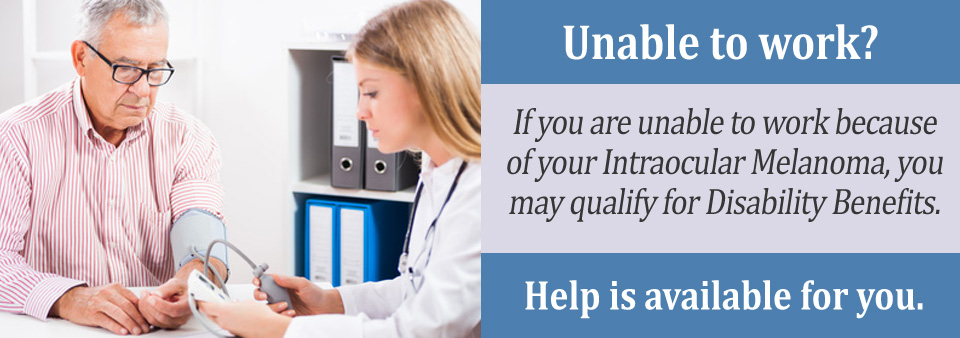Dealing with intraocular melanoma (eye cancer) can be exhausting and painful. Cancer is always painful, but when it affects one of your five senses, the experience can be especially traumatic. Having your sight limited by an illness can affect your ability to do just about anything, and this includes your ability to work. Between your vision loss and the treatment for eye cancer itself, working may just not be possible for you at the moment.
You do have options for achieving financial stability when you’re unable to work. Eye cancer is one of the conditions that could help you qualify for Social Security disability benefits. You may qualify for monthly Social Security Disability benefits if you are unable to work due to a medical condition.
Back to topEye Cancer Blue Book Listing
The Social Security Administration decides who gets to receive benefits and naturally, the organization needs a rubric to determine that. That rubric is the Blue Book, a list of conditions and guidelines that the SSA uses to decide whether you should receive benefits for your condition.

The Blue Book is split up into 14 sections, and each one covers different types of conditions. You’ll find cancer listed in Section 13.00, and the details about qualifying conditions for eye cancer are part of Section 13.29, which is “Malignant melanoma (including skin, ocular, or mucosal melanomas).” That section states that you can qualify for benefits if your eye cancer:
- Is recurrent even after enucleation (which is removal of the eye)
- Moves to different sites of your body, such as your brain, lung(s), or liver
Essentially, if your eye cancer is aggressive, recurrent, and/or treatment-resistant, you’ll have a chance of qualifying for Social Security disability benefits.
Of course, you need to be able to show the Social Security Administration that your cancer is aggressive, and to do that, you’ll have to gather up the relevant medical documents to prove it. You could use x-rays, MRI/CT scans, doctor’s notes, or biopsy reports, to name a few options. Whatever you choose, be sure that it presents a complete picture of your condition to the SSA.
Back to topCompassionate Allowance
SSD benefits can be life-changing, but there are thousands of people applying for benefits at any given time. This means that it can take at least six months to even get to have a hearing, and depending on your area, it could be over a year. If you’re in a position where you can’t work and need the money right away, you simply may not be able to wait that long.
To address this issue, there is the Compassionate Allowance Initiative. If you apply for compassionate allowances, you’ll be getting benefits much sooner; the program is meant to address the long wait times for SSD hearings by dispersing benefits to people with severe conditions in a more timely fashion.
Eye cancer isn’t specifically listed as a compassionate allowance condition, but if it has spread to another part of your body that is listed under the list of compassionate allowance conditions, then you may still be eligible to qualify for those benefits. For example, if your eye cancer has spread to your thyroid, you could attempt to get compassionate allowance benefits for the thyroid cancer.
Like SSD benefits, the application process for compassionate allowances will require you to present documentation of your illness. An example would be an x-ray that shows that your eye cancer has spread somewhere else, thereby helping you qualify for a compassionate allowance.
Back to topHow an Attorney Can Help
Applying for SSD benefits while also attempting to recover from something like eye cancer requires an enormous amount of strength. As you have probably experienced, your strength is in limited supply at a time like this. Fortunately, you don’t have to do this alone.
If you’re considering applying, try contacting a Social Security disability attorney to help you file your claim. Don’t worry about paying upfront; you won’t have to. In fact, your lawyer won’t get compensated at all unless you win your case. Save your strength for your health, and let your attorney do the rest.
Back to top